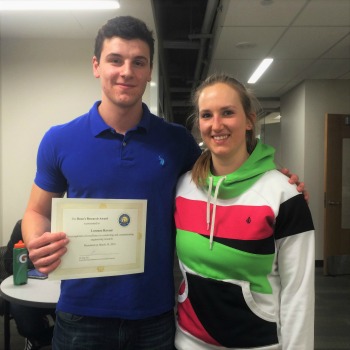
Lorenzo Ravani, a second-year Mechanical Engineering student and Brooklynn Knowles, a third-year PhD student in Mechanical Engineering are researching ways of designing safer helmets.
(Edmonton) More than 100 undergraduate engineering students took part this term in research projects covering fields as diverse as building better bicycle helmets to launching a satellite into outer space.
The Dean's Research Award Presentations, a regular end-of-term showcase of undergraduate student research projects, featured captivating talks delving into various fields of engineering. Each speaker had up to 10 minutes to present their research - an early draft, or a ready-to-use solution to an engineering challenge. What all of the presentations had in common, however, was co-operation and mentorship between undergraduate and graduate students and professors that helped nurture creative ideas.
Lorenzo Ravani, a second-year mechanical engineering student, is getting close to making sports helmets safer. Developed in collaboration with Brooklynn Knowles, a third-year PhD student in Mechanical Engineering, and supervised by mechanical engineering professor Christopher Dennison, the project looks into ways of improving helmets to prevent severe head and neck injuries. The initiative can further translate into certifying the safest design to be adopted for manufacturing different kinds of helmets.
"Ultimately, we are looking into all kinds of helmets: bike helmets, football helmets, hockey helmets. Today we have focused on hockey helmets, but we are looking to expand that to different types as we move forward," says Knowles.
What drove the two students to challenging themselves to develop a new helmet design was real-life injuries: both Knowles and Ravani played a lot of sports that required helmets, and could definitely have used safer gear.
"I played football in high school, and I definitely got a couple of concussions in Grade 11. In engineering, I always worked on the technical side of things, but when I was looking at topics for the Dean's Research Award, I thought "Tthis is a real-life application, I am going to give it a shot," " says Ravani.
Christopher Robson, a fifth-year mechanical engineering student and a member of AlbertaSat team, a student group that is building Alberta's first satellite, was researching the possibility of designing a cube satellite to reach a specific altitude. More specifically, Robson was examining the existing technology and its capabilities to allow a satellite to fly between 150-300 kilometres, the altitude satellites do not normally fly at.
Some of the presentations addressed extra-terrestrial challenges: Tim Yuheng Zhou talked about his research on eliminating errors in measuring wind speed on Mars. The project is supervised by mechanical engineering professor Carlos Lange, who built one of the weather-monitoring instruments used aboard the Phoenix Mars lander.
The Dean's Research Award program gives undergraduate students a taste of what it is like to conduct a research working with prolific scholars and students already enrolled in graduate programs. What's more, students can see an actual application of theoretical knowledge they've been acquiring in school. "You don't normally get to do this sort of thing through normal schooling. We get to research problems that we are really interested in. We get to work with professors as well and see what it's like to become a master's student one day, or a PhD. I think it's really cool," says Robson.